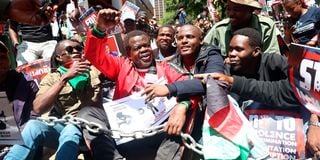Premium
Abductions: Activists say protests resume on Monday

Busia Senator Okiya Omtatah (center) with other protesters during the anti-abduction protests on Aga Khan walk in downtown Nairobi on December 30, 2024.
What you need to know:
- The protesters say they will be demanding the release of all abducted persons.
- Organisers told the Nation that they had picked three different locations in Nairobi.
Rights activists say they will resume street demos to protest the abduction of critics of President William Ruto’s government on Monday, January 6, with organisers vowing to occupy several towns and cities.
The protesters said they will be demanding the release of all abducted persons, as well as the arrest and prosecution of the people behind the enforced disappearances of Kenyans since June 2024, at the height of youth-led anti-government protests.
This will be the second wave of the anti-abduction protests in the country after the first rocked parts of Nairobi, Mombasa, Embu, and Karatina on December 30 and saw dozens arrested.
In Nairobi, police officers managed to disperse the picketers before cornering them at the Aga Khan Walk where they arrested about 15, including Busia Senator Okiya Omtatah.
Unlike last week when the protests majorly took place on one street, one of the organisers on Sunday told the Nation that they had picked three different locations in Nairobi.
“What you saw last time was just the beginning. We have not even started. We will continue with our protests until every abducted Kenyan is released. It will not be business as usual tomorrow; we have identified three spots in the city centre (Nairobi). We picked our lessons from last week and this time the coordination will be better,” he said.
In Mombasa, a group dubbed “Kenyans Against Abductions” wrote a letter notifying police of their plans to protest against abductions and other human rights violations on Monday.
“The peaceful protest will start from Pembe za Ndovu through Nyerere Avenue to Pandya roundabout, then to Urban Police Roundabout through Mombasa Law Courts then end at Uhuru na Kazi building to present a petition to the County Commissioner, Mombasa County,” the letter reads in part.
Social media platforms were also awash with posters calling on Kenyans to come out armed with placards bearing anti-abduction messages, mobile phones, water, and Kenyan flags.
Ongoing abductions and enforced disappearances in the country have stirred a heated debate, with top leaders trading blame games.
Last Friday, the emotive subject resurfaced in front of President William Ruto during the funeral service of the mother of National Assembly Speaker Moses Wetang’ula in Kabuchai, Bungoma, as leaders clashed.
So serious was the exchange that President Ruto was forced to address the matter, saying the Inspector-General of Police Douglas Kanja should provide answers to questions raised by Kenyans.
“The National Police Service, being an independent body, is able to conduct investigations.” Dr Ruto said.
Over the past six months, cases of abductions and enforced disappearances have become the order of the day in the country with parents living in fear of their young children being picked up by hooded men wielding guns and disappearing without a trace.
Beginning June last year, at least 82 cases of abductions, according to the Kenya National Commission on Human Rights, have been reported in the country with 29 of these cases not yet resolved.
The latest victims of abductions include Steve Mbisi from Machakos, Billy Mwangi (Embu), Peter Muteti (Nairobi), Bernard Kavuli (Nairobi), Gideon Kibet, alias Kibet Bull (Nairobi) and Rony Kiplang'at (Kiambu).





